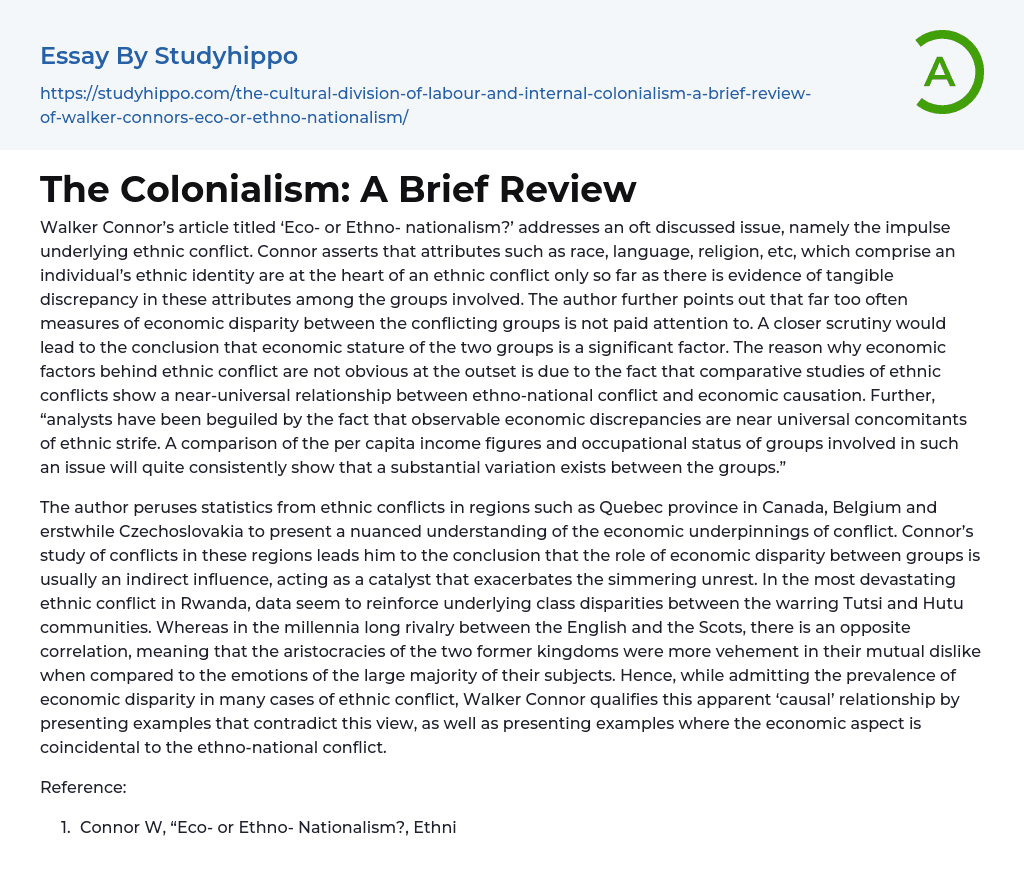In his article titled ‘Eco- or Ethno- nationalism?’, Walker Connor discusses the underlying motivation behind ethnic conflicts. Connor argues that ethnic conflicts are primarily driven by factors such as race, language, religion, etc, which form an individual's ethnic identity, only if there is observable disparity in these attributes among the groups involved. Additionally, Connor highlights that the economic disparity between the conflicting groups is often neglected in these discussions.
The economic stature of the two groups is a significant factor in ethnic conflict, although it may not be immediately apparent. Comparative studies of ethnic conflicts consistently show a relationship between ethno-national conflict and economic causes. Economic discrepancies are often present in ethnic strife, as seen through per capita income figures and occupational status. The author examines statistics from conflicts in Quebec province, Belgium, and former Czechoslovakia to gain a nuanced understanding of the
...economic roots of conflict. From these studies, Connor concludes that economic disparity between groups typically acts as an indirect catalyst, exacerbating underlying unrest.
In the most devastating ethnic conflict in Rwanda, data suggest that underlying class disparities between the Tutsi and Hutu communities reinforced the conflict. Conversely, in the long rivalry between the English and the Scots, there is an opposite correlation, with the aristocracies of the two former kingdoms displaying more intense mutual dislike compared to their subjects. Hence, while economic disparity commonly contributes to ethnic conflicts, Walker Connor presents examples that challenge this apparent cause-effect relationship and also provides instances where the economic aspect coincides with the ethno-national conflict.
Reference:
- Connor W, “Eco- or Ethno- Nationalism?, Ethnic and Racial Studies, 7,3, 1984 pp.342-359
The readings present different perspectives on 'the scramble fo
Africa'. Scholars during the colonial era propagated the belief that native Africans were somewhat barbaric and backwards and needed guidance from a more civilized people. While this assessment holds some truth, as Africa remains technologically backward even today, cultural backwardness is a subjective judgment.
But one must approach colonial scholarship with caution as it frequently veers towards propaganda. The events in Europe at that time lend support to the idea that Africa was simply another arena for European power struggles. The "scramble for Africa" took place when advancements in naval technology enabled countries like Britain, Germany, Netherlands, France, Belgium, and Portugal to expand their empires into distant territories. Therefore, the notion that European motives towards Africa were rooted in "benevolence" is both historically and logically weak. To argue otherwise would be disregarding the evidence.
- South Africa essays
- Nigeria essays
- Christopher Columbus essays
- Pilgrims essays
- Simon Bolivar essays
- Exploration essays
- Afghanistan essays
- Africa essays
- America essays
- Asia essays
- Australia essays
- Caribbean essays
- City essays
- Developing Country essays
- Dubai essays
- Earthquake essays
- Europe essays
- Fracking essays
- Georgia essays
- Middle East essays
- Natural Disaster essays
- New Zealand essays
- North Korea essays
- South Korea essays
- Thailand essays
- Travel essays
- 1920S essays
- 1950S essays
- 1960S essays
- 19Th Century essays
- 20Th Century essays
- Ancient Greece essays
- Bravery essays
- British Empire essays
- Civilization essays
- Colonialism essays
- Declaration of Independence essays
- Evidence essays
- Genocide essays
- Gilded Age essays
- Historical Figures essays
- Historiography essays
- History of the United States essays
- Letter from Birmingham Jail essays
- Louisiana Purchase essays
- Nazi Germany essays
- Rebellion essays
- Revolution essays
- Roman Empire essays
- Russian Empire essays




